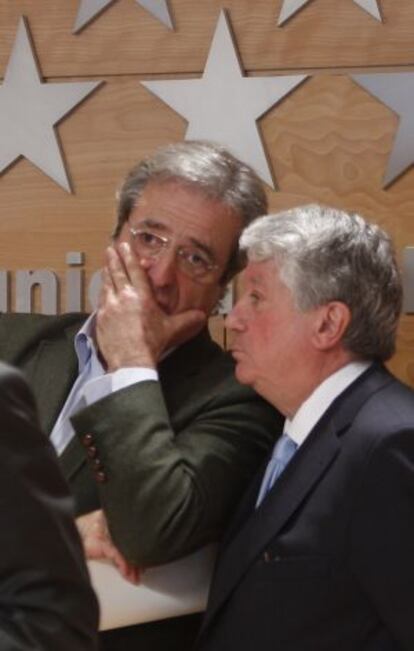Spanish Tax Agency to investigate Bankia for possible €15.5-million fraud
All 86 bank officials who used undeclared credit cards could face scrutiny

The Spanish Tax Agency is to investigate bailed-out lender Bankia for possible tax crimes worth €15.5 million in connection with undeclared credit cards used by board members and executives between 2003 and 2012.
The 86 card holders – who include ex-IMF chief Rodrigo Rato and Gerardo Diaz Ferrán, former chief of Spain’s largest business association – could be affected by this investigation into massive tax fraud even if their personal spending did not surpass the €120,000 threshold that constitutes a tax crime in Spain, sources familiar with the situation said.
Ten people have resigned or been dismissed from their posts since the scandal broke last Wednesday.
The Tax Agency feels there is preliminary evidence that Caja Madrid and later Bankia, the umbrella lender created from the merger of the former with six other regional savings banks, purposely created an opaque system to conceal the existence of the credit card expenses.
Under chairmen Miguel Blesa and later Rodrigo Rato, executives and board members spent thousands of euros — in some cases, over €200,000 each — on alleged representation costs. Documents in the possession of the High Court, which is already conducting a probe into the case, show that some card recipients used bank funds to purchase clothing, groceries, restaurant meals, jewelry, trips to New York and lottery tickets, among other things.
Ten people have resigned or been dismissed from their posts since the scandal broke last Wednesday
Now, tax authorities are trying to determine whether bank officials in the know used a method that consisted of rounding off large amounts of money to create a hidden cash fund for these credit card expenditures.
Another major issue at stake is whether Caja Madrid or Bankia would be held responsible in the event that a crime is confirmed. Bankia holds that the system began with Caja Madrid, but admits that it was maintained after the merger in 2010.
The credit card scheme ended in May 2012, when a new chairman was brought in to clean up the struggling lender’s accounts. José Ignacio Goirigolzarri reported his findings to authorities, triggering the investigation.
Tu suscripción se está usando en otro dispositivo
¿Quieres añadir otro usuario a tu suscripción?
Si continúas leyendo en este dispositivo, no se podrá leer en el otro.
FlechaTu suscripción se está usando en otro dispositivo y solo puedes acceder a EL PAÍS desde un dispositivo a la vez.
Si quieres compartir tu cuenta, cambia tu suscripción a la modalidad Premium, así podrás añadir otro usuario. Cada uno accederá con su propia cuenta de email, lo que os permitirá personalizar vuestra experiencia en EL PAÍS.
¿Tienes una suscripción de empresa? Accede aquí para contratar más cuentas.
En el caso de no saber quién está usando tu cuenta, te recomendamos cambiar tu contraseña aquí.
Si decides continuar compartiendo tu cuenta, este mensaje se mostrará en tu dispositivo y en el de la otra persona que está usando tu cuenta de forma indefinida, afectando a tu experiencia de lectura. Puedes consultar aquí los términos y condiciones de la suscripción digital.









































